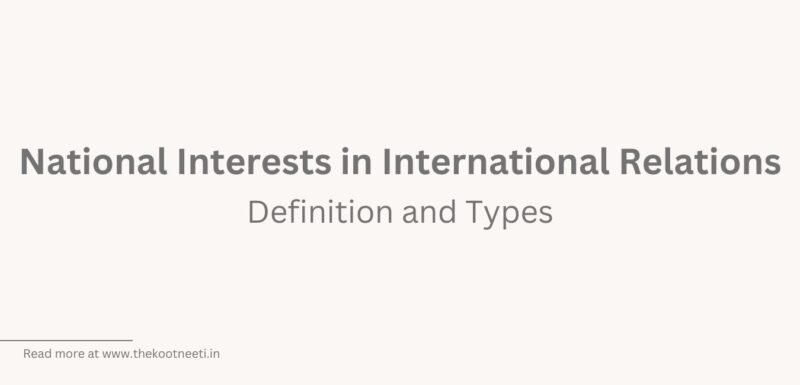National Interests in International Relations: Definition and Types

The national interest is a concept that refers to the goals, values, and objectives that a nation seeks to advance and protect. The national interest is often used to guide the foreign policy of a country, as it provides a framework for determining which actions and decisions are in the best interests of the nation.
The national interest can be influenced by a variety of factors, including economic considerations, national security, and the promotion of values such as democracy and human rights. Different governments and political actors may have different views on what constitutes the national interest, and the national interest can change over time as a country’s circumstances and priorities change.
In foreign policy, the national interest is often balanced against the interests of other nations and international organizations. For example, a country may seek to promote its own national interest by negotiating trade agreements or by forming alliances with other countries, but it may also need to consider the interests of other nations and the impact of its actions on the international community.
Types of national interests in International Relations
There are many different types of national interests that a country may seek to advance and protect. Some examples of national interests include:
- Economic interests: These can include promoting economic growth, protecting domestic industries, and securing access to natural resources, markets, and other economic opportunities.
- National security interests: These can include protecting the country from external threats such as military aggression, terrorism, and cyber attacks, as well as maintaining a strong military and intelligence capabilities.
- Political interests: These can include promoting democratic values, protecting human rights, and supporting stable and effective governance within the country and around the world.
- Cultural interests: These can include preserving and promoting the country’s cultural heritage, language, and traditions.
- Environmental interests: These can include protecting the country’s natural resources and promoting environmental sustainability.
- Humanitarian interests: These can include providing assistance to other countries in need, such as in the aftermath of natural disasters or conflicts.
- Strategic interests: These can include securing access to key transportation routes, such as sea lanes, or maintaining a presence in key regions of the world.
The specific national interests of a country can vary depending on its size, location, resources, and other factors.



















